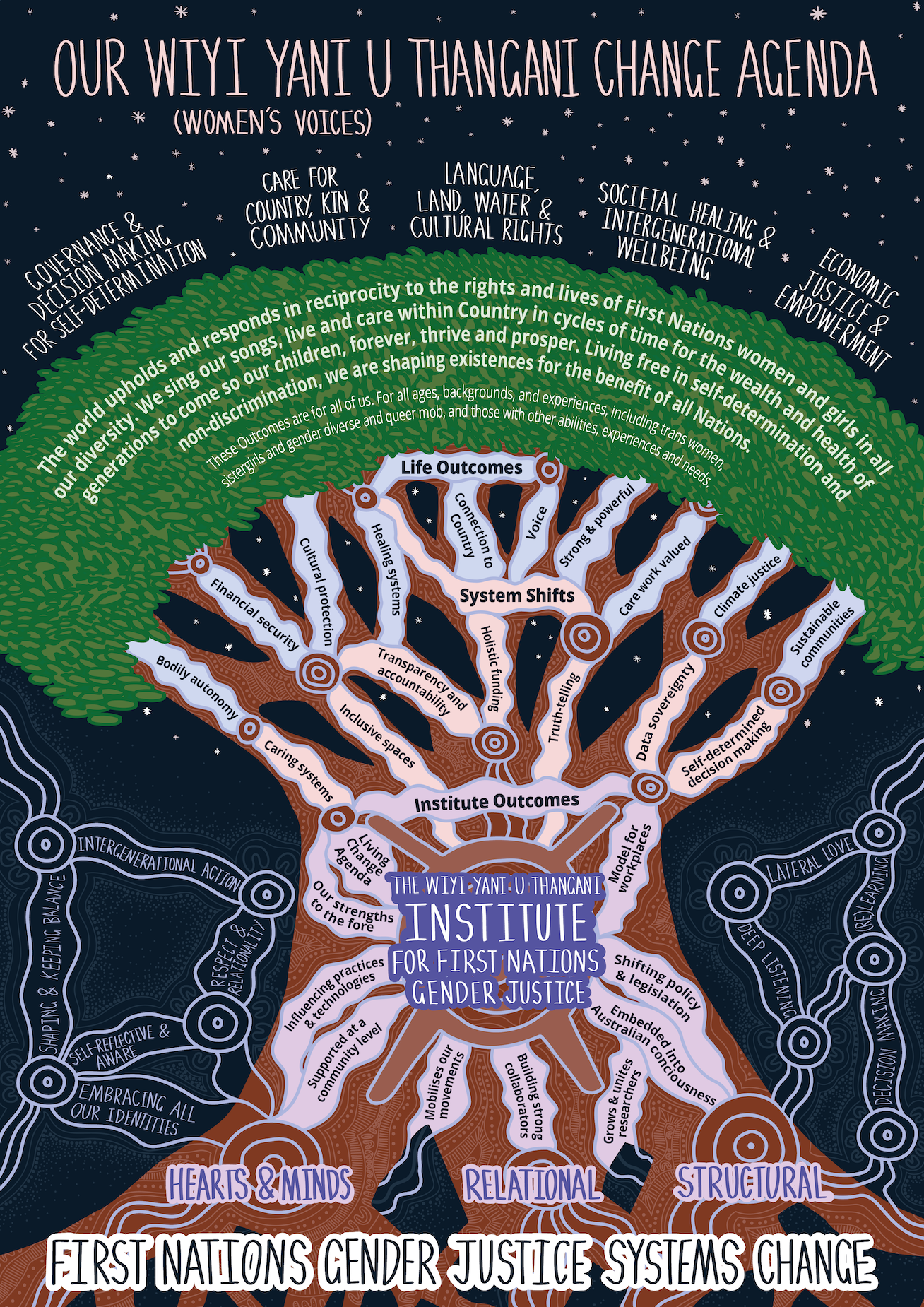
The Wiyi Yani U Thangani Change Agenda for First Nations Gender Justice (the Change Agenda), released in 2024 alongside the launch of the Institute, is the first document of its kind to exist at a national level—designed by and for First Nations women, girls and gender-diverse people. The Change Agenda embodies a collective vision for gender justice and equality, defining the changes First Nations women, girls and gender-diverse people want to see for their children, families, communities, culture and Country. It describes three layers of outcomes focused on the generational work of the Institute, broader systemic shifts and long-term life outcomes, as well as establishing the visionary conditions for a life well lived.
Whilst realising the outcomes of the Change Agenda requires societal-wide commitment, the Institute plays a key role indriving this change. The Change Agenda guides how we design the Institute’s work, measure impact, and uphold our accountability to First Nations women, girls and gender-diverse people. It outlines a comprehensive systems change approach and Measurement, Evaluation and Learning (MEL) framework to help us track progress and build evidence for change, from the ground up.
Ensuring that the Change Agenda is grounded in First Nations womens voices, in all their diversity, the Institute team engaged in focus groups, sought submissions and received feedback from the National Summit. Here's some of the key takeaways.
In late 2023, we held a National submissions process to gather insights on data, measurement and evaluation approaches to be used in and alongside the Change Agenda and Institute so that we can accurately reflect the values, needs and priorities of First Nations women and girls, and gender-diverse mob.
We received submissions from far and wide, ranging from individuals, community organisations, government agencies, non-government agencies, and researchers across Australia and beyond. We are incredibly grateful to everyone who provided a submission and are excited to put these insights into practice.
See the 'resources' page to read the Submissions received. Please note these are only the submissions provided that the authors consented to being made public.
Some things we learned from the submissions are:
In 2023, we held focus groups with different community groups, including youth, women living with disability, lesbian, bisexual, queer and non-binary mob, transwomen/sistergirls, and women engaged in community practices. We also held conversations with our advisory group, made up of women across all sectors.
These yarns raised, among many important topics, the importance of language, inclusivity, creating agency, challenging ways of thinking, and shifting systems to better support mob in all our diversity.
These voices and the discussions from these yarns are actively informed the Change Agenda, and are adding to the thousands of voices that we have heard throughout stage one and two of Wiyi Yani U Thangani.
Feedback was initially sought from delegates attending the Wiyi Yani U Thangani National Summit: We are the Change held in May 2023 through a post-summit survey and gathered through discussions during summit presentations and sessions. This feedback has provided useful insight guiding the design phases of this exciting work.
Delegates called for the Wiyi Yani U Thangani Framework for Action for First Nations Gender Justice and Equality (working title) and First Nations Gender Justice Institute to incorporate the existing Ways of Working used in the Wiyi Yani U Thangani Implementation Framework, stressing the importance of empowering all First Nations women, in all their diversity, and across all ages. As many women reflected, the Framework and Institute must be co-designed with us, for us - the Institute acting as a place for First Nations women’s knowledges and practices, and a safe and empowering environment for voices to be heard and responded to.
The Framework and Institute should be culturally appropriate, use a decolonising approach, be trauma-informed, honest and hold integrity. Priorities and ways of working should align with other policies and practices across Australia, including the Closing the Gap agenda, Uluru Statement from the Heart and the United Nations Declaration on the Rights of Indigenous Peoples.
The Framework must be an empowering and self-determined scaffold for the future, grounded in First Nations women’s ways of knowing, doing and being, truth-telling, and strengths and best practices. It should create a sustainable way forward that reflects First Nations women’s values, priorities and goals. In doing so, it should be flexible and resilient, acting as a living governance structure for a better, stronger future for all.
Reflecting on measurement and evaluation, women acknowledged that data should be collected in collaboration with communities and uphold principles of Indigenous data sovereignty and governance. The approach taken should speak to what First Nations women and girls feel, see, sense and hear, so as to be grounded in lived experience, and respect, value and respond to this experience, equal to or above formal western qualitative and quantitative evaluation methodologies. This emphasis provides a more nuanced understanding of how actions, indicators, targets and goals impact women and girls across all facets of their lives. This approach ensures that outcomes and data collected are viewed within a holistic context, where women’s lives are embedded in women’s knowledge and ways of working.
Women suggested evaluation and measurement could take place through national surveys (annual, quarterly, broad or topic-focused) or regular yarning with communities. The data collected should be measured against community-developed baselines connecting to culture and community priorities, not in comparison to others, and through a strengths-based and holistic approach. Others suggested data should be evaluated against national data sets and studies to reflect systemic changes across key areas. Reporting and measurement should also be made public, transparent, and accessible to First Nations peoples across Australia – presented in different formats and languages. Reporting should be responded to authentically by all stakeholders involved – recognising that the data holds meaning and should be treated respectfully.
Women also raised questions regarding how the Framework and Institute might interact with government bodies, and how it can best be used in different settings, including as an educative tool, to make change happen.
